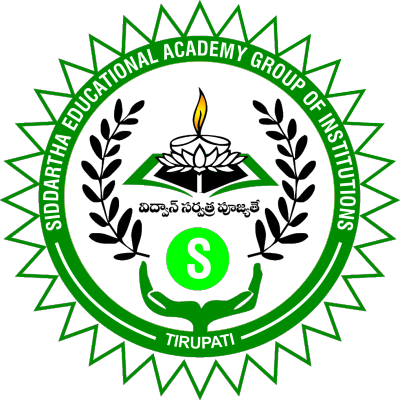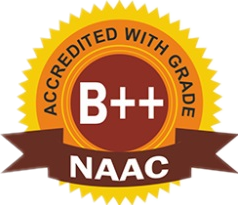Siddhartha Educational Academy
Computer Science and Engineering
Computer Science and Engineering (CSE) at SEAT symbolizes the SEAT tradition of excellence as a leader in computer science and engineering. The department is dedicated to education, research and overall excellence.
CSE Graduates capture leading appointments in IT service industries, as well as fuel the Internet, wireless communications, and cross-disciplinary IT Industries. The CSE program at SEAT was started in 2012. Recognized by AICTE and affiliated to JNTUA, Anantapuram the current intake is 24 students.
The CSE Department continues to recruit faculty members with rich experience in academia, industry and research, and support superior research facilities. A large diverse faculty committed to teaching and research teaches CSE classes. Faculty use state-of-art teaching aids to ensure better content delivery and facilitate greater student interaction. Faculty commitment to excellence in teaching has been recognized and honored with numerous engineering and institution teaching awards. In addition to classes, students also have the opportunity to interact with faculty through student mentoring.
VISION:
To become a centre of excellence in the field of Computer Science and Engineering that produces innovative, skillful, socially responsible and ethical professionals.
MISSION:
- To provide a balanced curriculum with engineering fundamentals, modern technologies and research
- To provide opportunities to solve real world problems
- To provide opportunities for the overall personal and social skill development
| Program Educational Objectives (PEOs) | |
| PEO1 | Exhibit Technical knowledge for gainful placements and make significant contributions to the domain of Computer Science and Engineering. |
| PEO2 | Be competent to design and develop a wide range of products to be a successful Entrepreneur. |
| PEO3 | Involve in lifelong learning through professional training, recognitions and memberships in professional societies and practice software system development, maintenance and administration. |
| Program Outcomes (POs) | |
| PO1 | Engineering Knowledge: Apply knowledge of mathematics, science, engineering fundamentals, and an engineering specialization to the solution of complex engineering problems. |
| PO2 | Problem analysis: Identify, formulate, review research literature and analyze complex engineering problems reaching substantiated conclusions using first principles of mathematics, natural sciences, and engineering sciences. |
| PO3 | Design/development of solutions: Design solutions for complex engineering problems and design system components or processes that meet the specified needs with appropriate consideration for the public health and safety, and the cultural, societal, and environmental considerations. |
| PO4 | Conduct investigations of complex problems: Use research-based knowledge and research methods including design of experiments, analysis and interpretation of data, and synthesis of the information to provide valid conclusions |
| PO5 | Modern tool usage: Create, select, and apply appropriate techniques, resources, and modern engineering and IT tools including prediction and modelling to complex engineering activities with an understanding of the limitations. |
| PO6 | The engineer and society: Apply reasoning informed by the contextual knowledge to assess societal, health, safety, legal and cultural issues and the consequent responsibilities relevant to the professional engineering practice. |
| PO7 | Environment and sustainability: Understand the impact of the professional engineering solutions in societal and environmental contexts, and demonstrate the knowledge of, and need for sustainable development. |
| PO8 | Ethics: Apply ethical principles and commit to professional ethics and responsibilities and norms of the engineering practice. |
| PO9 | Individual and team work: Function effectively as an individual, and as a member or leader in diverse teams, and in multidisciplinary settings. |
| PO10 | Communication: Communicate effectively on complex engineering activities with the engineering community and with society at large, such as, being able to comprehend and write effective reports and design documentation, make effective presentations, and give and receive clear instructions. |
| PO11 | Project management and finance: Demonstrate knowledge and understanding of the engineering and management principles and apply these to one’s own work, as a member and leader in a team, to manage projects and in multidisciplinary environments. |
| PO12 | Life-long learning: Recognize the need for, and have the preparation and ability to engage in independent and life-long learning in the broadest context of technological change. |
| Program Specific Outcomes (PSOs) | |
| PSO1 | Understand, analyze, and apply Computer Science and Engineering knowledge to provide solutions to real world problems |
| PSO2 | Ability to take up higher studies, Research and development in modern computing environment |
| PSO3 |
Students should be able to apply ethical principles and commit to professional and social responsibilities. |
The Department has 480 Systems with Latest Configurations associated with the following Laboratories:
1. C PROGRAMMING LAB
2. DATA STRUCTURS LAB
3. JAVA PROGRAMMING LAB
4. SOFTWARE TESTING LAB
5. OBJECT ORIENTED ANALYSIS AND DESIGN LAB
6. DATA WAREHOUSING AND MINING LAB
7. WEB AND INTERNET TECHNOLOGY LAB
8. MOBILE APPLICATION DEVELOPMENT LAB
9. PYTHON PROGRAMING LAB
10. DATA BASE MANAGEMENT SYSTEMS LAB
11. OPERATING SYSTEMS LAB
12. GRID AND CLOUD COMPUTING LAB
Computer Science and Engineering (CSE) at SEAT symbolizes the SEAT tradition of excellence as a leader in computer science and engineering. The department is dedicated to education, research and overall excellence.
CSE Graduates capture leading appointments in IT service industries, as well as fuel the Internet, wireless communications, and cross-disciplinary IT Industries. The CSE program at SEAT was started in 2012. Recognized by AICTE and affiliated to JNTUA, Anantapuram the current intake is 24 students.
The CSE Department continues to recruit faculty members with rich experience in academia, industry and research, and support superior research facilities. A large diverse faculty committed to teaching and research teaches CSE classes. Faculty use state-of-art teaching aids to ensure better content delivery and facilitate greater student interaction. Faculty commitment to excellence in teaching has been recognized and honored with numerous engineering and institution teaching awards. In addition to classes, students also have the opportunity to interact with faculty through student mentoring.
VISION:
To become a centre of excellence in the field of Computer Science and Engineering that produces innovative, skillful, socially responsible and ethical professionals.
MISSION:
- To provide a balanced curriculum with engineering fundamentals, modern technologies and research
- To provide opportunities to solve real world problems
- To provide opportunities for the overall personal and social skill development
| Program Educational Objectives (PEOs) | |
| PEO1 | Exhibit Technical knowledge for gainful placements and make significant contributions to the domain of Computer Science and Engineering. |
| PEO2 | Be competent to design and develop a wide range of products to be a successful Entrepreneur. |
| PEO3 | Involve in lifelong learning through professional training, recognitions and memberships in professional societies and practice software system development, maintenance and administration. |
| Program Outcomes (POs) | |
| PO1 | Engineering Knowledge: Apply knowledge of mathematics, science, engineering fundamentals, and an engineering specialization to the solution of complex engineering problems. |
| PO2 | Problem analysis: Identify, formulate, review research literature and analyze complex engineering problems reaching substantiated conclusions using first principles of mathematics, natural sciences, and engineering sciences. |
| PO3 | Design/development of solutions: Design solutions for complex engineering problems and design system components or processes that meet the specified needs with appropriate consideration for the public health and safety, and the cultural, societal, and environmental considerations. |
| PO4 | Conduct investigations of complex problems: Use research-based knowledge and research methods including design of experiments, analysis and interpretation of data, and synthesis of the information to provide valid conclusions |
| PO5 | Modern tool usage: Create, select, and apply appropriate techniques, resources, and modern engineering and IT tools including prediction and modelling to complex engineering activities with an understanding of the limitations. |
| PO6 | The engineer and society: Apply reasoning informed by the contextual knowledge to assess societal, health, safety, legal and cultural issues and the consequent responsibilities relevant to the professional engineering practice. |
| PO7 | Environment and sustainability: Understand the impact of the professional engineering solutions in societal and environmental contexts, and demonstrate the knowledge of, and need for sustainable development. |
| PO8 | Ethics: Apply ethical principles and commit to professional ethics and responsibilities and norms of the engineering practice. |
| PO9 | Individual and team work: Function effectively as an individual, and as a member or leader in diverse teams, and in multidisciplinary settings. |
| PO10 | Communication: Communicate effectively on complex engineering activities with the engineering community and with society at large, such as, being able to comprehend and write effective reports and design documentation, make effective presentations, and give and receive clear instructions. |
| PO11 | Project management and finance: Demonstrate knowledge and understanding of the engineering and management principles and apply these to one’s own work, as a member and leader in a team, to manage projects and in multidisciplinary environments. |
| PO12 | Life-long learning: Recognize the need for, and have the preparation and ability to engage in independent and life-long learning in the broadest context of technological change. |
| Program Specific Outcomes (PSOs) | |
| PSO1 | Understand, analyze, and apply Computer Science and Engineering knowledge to provide solutions to real world problems |
| PSO2 | Ability to take up higher studies, Research and development in modern computing environment |
| PSO3 |
Students should be able to apply ethical principles and commit to professional and social responsibilities. |
The Department has 480 Systems with Latest Configurations associated with the following Laboratories:
1. C PROGRAMMING LAB
2. DATA STRUCTURS LAB
3. JAVA PROGRAMMING LAB
4. SOFTWARE TESTING LAB
5. OBJECT ORIENTED ANALYSIS AND DESIGN LAB
6. DATA WAREHOUSING AND MINING LAB
7. WEB AND INTERNET TECHNOLOGY LAB
8. MOBILE APPLICATION DEVELOPMENT LAB
9. PYTHON PROGRAMING LAB
10. DATA BASE MANAGEMENT SYSTEMS LAB
11. OPERATING SYSTEMS LAB
12. GRID AND CLOUD COMPUTING LAB
Admissions
For more details on admissions and seat availability ..contact here

